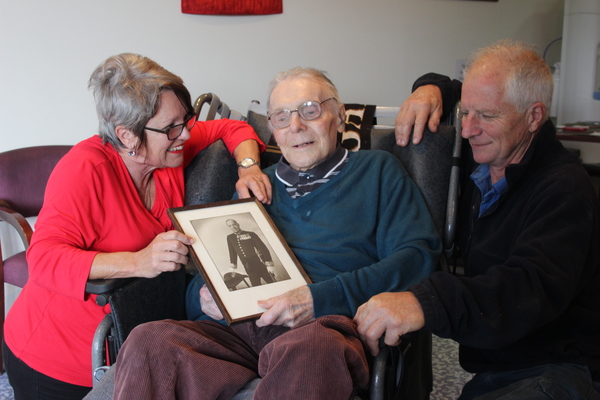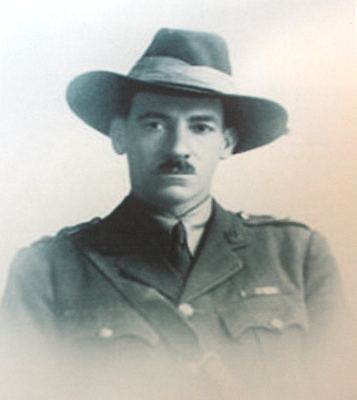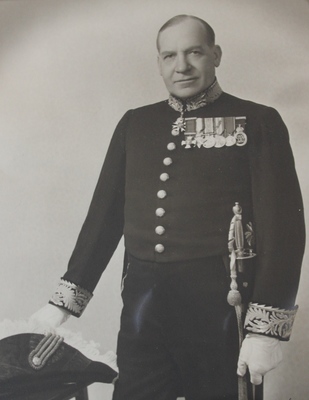
By Kath Gannaway
As Yarra Junction woman Sally Brennan attends commemorations to mark the Centenary of the Battle of Beersheba today, 31 October, her thoughts, and no doubt tears, will be with her grandfather Brigadier Sir Murray William James Bourchier, CMG, DSO, VD.
And, for Sally and her brothers who have travelled to Israel for the Beersheba services, their thoughts will also be of their uncle, Bill Bourchier, Sir Murray’s last surviving child who sadly passed away earlier this year.
Bill had been without his father for more than 80 years but as he clutched a photo of his dear dad when Sally and her brother Chris talked with the Mail just after Anzac Day this year, it was clear that the passing of the years had not dimmed the love and admiration.
Murray Bourchier joined the Light Horse as a young man in 1909 and went on to serve with them in Egypt and on Gallipoli before crossing the Suez Canal into the Turkish-held Sinai Desert in 1917. Promoted to captain, major and then lieutenant-colonel, he was given command of the 4th Light Horse Regiment and personally directed his men into their first action in Palestine, the attack on Beersheeba on 31 October, 1917.
This was an heroic action, and while leading his troops into the battle he also fought on the frontline alongside them, many mates from his own home district, at full gallop over two miles to capture water wells that were crucial to the Allies if they were to advance any further.
In the months that followed he was with them as they moved into the Jordan Valley to take part in the Es Salt raids. On 30 September, 1918, as part of the advance guard of the Australian Mounted Division they advanced from Sasa to Damascus capturing the enemy position at Kaukab, held by 2500 Turks with machine-guns.
Leading the charge were the two regiments in his command, known as ‘Bourchier’s Force’. They opened the way to Damascus where his troops were the first to enter, capturing the town in what was to be the last-ever cavalry charge for the Light Horse.
“We grew up very much with the knowledge of our grandfather,” Sally said as she and her brother Chris sat with their Uncle Bill ahead of their trip to Israel.
“We had an enormous portrait by Sir John Longstaff that hung in the sitting room when we were little.”
Sally and Chris’s mother was one of Sir Murray and his wife Minona’s three children, Murray, Bill and Elaine.
Sally said there is a lot written about her famous grandfather.
“When we were kids mum had shown us packets of tissue paper dispatches that had been sent home, pencil-drawn maps and other things, so that family history was very much part of growing up.
“Our brother Peter used to wear his boots as a young uni student, and Uncle Bill is the last living connection with our grandfather,” she said.
Sally said the Australian soldiers had a reputation that put them at the front of the Beersheba and Damascus campaigns.
“After the charge at Beersheba the much more serious and harder campaign was to get to Damascus. What followed was incredibly difficult, so many lives lost in trying to reach Damascus, and the Australian soldiers were the ones chosen for that task because of the toughness of their horses and their own toughness.”
Brigadier Bourchier was Mentioned in Despatches three times during the war and was awarded both the Distinguished Service Order and Companion of the Order of the St Michael and St George for his outstanding achievements.
Chris said his grandfather was one of the fortunate ones.
“He came back seemingly intact where others were destroyed by it,” he said. “He came back decorated and admired and I think that is a testament to his natural leadership and that he was very strong mentally.“
In 1920 after returning home to farm after the war, he became Member for the Legislative Assembly for the Goulburn Valley and was Minister for Agriculture and Markets, Chief Secretary, Minister of Labour and Deputy Premier. He served several years as deputy leader of the Country Party and as leader from 1933 to 1935.
His maiden speech was an attack on the then government’s perceived neglect of ex-servicemen.
In 1936 Brigadier Bourchier was appointed Agent-General for Victoria in England, where he died at 57 years of age in 1937 and was posthumously knighted.
The Beersheba commemorations include a re-enactment of the charge by members of the Australian Light Horse Association, the opening of the new Light Horse Museum and a commemoration at the Park of the Australian Soldier in Be’er Sheva, as well as services at the British and at the Turkish Memorial.
The ABC will live cast the ceremony at the Commonwealth Cemetery at 6pm Australian time.
Links:
Anzac Museum at Beersheba www.jnf.org.au/the-anzac-museum-in-beersheba-commemorating-heroism
Australian National University Biography: http://adb.anu.edu.au/biography/bourchier-sir-murray-william-james-5303








